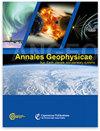下热层-电离层中电子、离子和中性温度的原位测量分析
IF 1.9
4区 地球科学
Q3 ASTRONOMY & ASTROPHYSICS
引用次数: 0
摘要
摘要同时了解电子、离子和中性的温度是理解和量化行星大气中能量传递过程的关键。然而,电子和离子温度测量通常是通过地面非相干散射雷达获得的,而电子、离子和中性温度测量的同时测量只能在现场进行。对于地球较低的热层-电离层,迄今为止唯一可用的电子、离子和中性温度的综合原位数据集是大气探测器C、D和E以及动力探测器2任务的数据集。在本研究中,我们首先对上述航天器原位任务的原位电子和离子温度测量结果与阿雷西博、米尔斯顿山和圣桑丁非相干散射雷达在这些航天器飞越雷达视场时的相应测量结果进行了所有共时共空交叉比较。这项研究扩展了先前的研究,该研究只考虑了大气探测器c的数据。结果表明,卫星和地面雷达测量结果之间的一致性很好。随后,在上述数据集中,所有离子温度似乎低于中性温度的情况都被确定并进行统计研究。尽管目前的理解表明,在较低的热层-电离层中,离子温度通常预计会高于中性温度,但在一些不可忽略的事件中,这种情况并不成立。提出并讨论了所有这些情况在海拔、纬度和经度上的分布。概述了导致中性温度高于离子温度的潜在原因,包括仪器效应或测量误差和物理原因。虽然不能根据目前的分析得出一个结论性的案例,但从本文提出的结果可以推测,并非所有的案例都可以归因于仪器效应或测量误差。这可能对目前的理解产生重大影响,即离子的能量预计将高于中性离子的能量,并指出需要在较低的热层-电离层(LTI)中进行额外的同步原位测量。本文章由计算机程序翻译,如有差异,请以英文原文为准。
Analysis of in situ measurements of electron, ion and neutral temperatures in the lower thermosphere–ionosphere
Abstract. Simultaneous knowledge of the temperatures of electrons, ions and neutrals is key to the understanding and quantification of energy transfer processes in planetary atmospheres. However, whereas electron and ion temperature measurements are routinely obtained from ground-based incoherent scatter radars, simultaneous measurements of electron, ion and neutral temperature measurements can only be made in situ. For the Earth's lower thermosphere–ionosphere, the only available comprehensive in situ dataset of electron, ion and neutral temperatures to date is that of the Atmosphere Explorers C, D and E and the Dynamics Explorer 2 missions. In this study we first perform a cross-comparison of all co-temporal and co-spatial measurements between in situ electron and ion temperature measurements from the above in situ spacecraft missions with corresponding measurements from the Arecibo, Millstone Hill and Saint-Santin incoherent scatter radars, during times of overflights of these spacecraft over the radar fields of view. This expands upon a previous study that only considered data from the Atmosphere Explorer C. The results indicate good agreement between satellite and ground-based radar measurements. Subsequently, out of the above datasets, all instances where ion temperatures appear to be lower than neutral temperatures are identified and are studied statistically. Whereas current understanding indicates that ion temperatures are generally expected to be higher than neutral temperatures in the lower thermosphere–ionosphere, a non-negligible number of events is found where this does not hold true. The distribution of all such cases in altitude, latitude and longitude is presented and discussed. Potential causes leading to neutral temperatures being higher than ion temperatures are outlined, including both instrumental effects or measurement errors and physical causes. Whereas a conclusive case cannot be made based on the present analysis, it is speculated from the results presented herein that not all cases can be attributed to instrument effects or measurement errors. This can have significant implications for the current understanding that the energy of the ions is expected to be higher than that of the neutrals and points to the need for additional simultaneous in situ measurements in the lower thermosphere–ionosphere (LTI).
求助全文
通过发布文献求助,成功后即可免费获取论文全文。
去求助
来源期刊

Annales Geophysicae
地学-地球科学综合
CiteScore
4.30
自引率
0.00%
发文量
42
审稿时长
2 months
期刊介绍:
Annales Geophysicae (ANGEO) is a not-for-profit international multi- and inter-disciplinary scientific open-access journal in the field of solar–terrestrial and planetary sciences. ANGEO publishes original articles and short communications (letters) on research of the Sun–Earth system, including the science of space weather, solar–terrestrial plasma physics, the Earth''s ionosphere and atmosphere, the magnetosphere, and the study of planets and planetary systems, the interaction between the different spheres of a planet, and the interaction across the planetary system. Topics range from space weathering, planetary magnetic field, and planetary interior and surface dynamics to the formation and evolution of planetary systems.
 求助内容:
求助内容: 应助结果提醒方式:
应助结果提醒方式:


